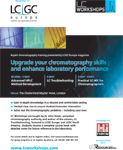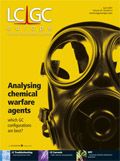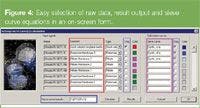LC Workshops
Three LC workshops will take place between 30 April and 4 May at the Chesterfield Mayfair Hotel, London, UK. The courses offer practical training aimed at improving chromatography skills to enhance laboratory performance. They are hosted by LCGC Europe in association with LC Resources and sponsored by Hichrom.
April–May 2007
LC Workshops
London, UK
Three LC workshops will take place between 30 April and 4 May at the Chesterfield Mayfair Hotel, London, UK. The courses offer practical training aimed at improving chromatography skills to enhance laboratory performance. They are hosted by LCGC Europe in association with LC Resources and sponsored by Hichrom.

The first course is Advanced HPLC Method Development and takes place on 30 April–1 May. Suitable for attendees with at least one year's HPLC experience in the laboratory, the two-day course will cover tools to develop methods faster. These include learning to develop rugged methods, designing system suitability checks and understanding the factors that control precision. The course offers a powerful new approach to systematic method development to help define clear objectives and apply best approaches to separating mixtures that contain acids, bases or isomers.
LC Troubleshooting is the second course to be held and takes place on 2 May. Designed for anyone who works with HPLC, the one-day masterclass course is open to workers with or without extensive experience in HPLC systems. Aimed at teaching new approaches to solving LC method problems, the course also teaches how to prevent such problems occurring in the first place. The course will include operating principles of each module in an HPLC system, proven techniques for systematic problem-solving and instrument maintenance; effective timesaving and money saving approaches to preventing common hardware problems and method failures and extensive case studies to hone your skills. Attendees will gain skills to solve HPLC problems logically and confidently and learn that the majority of problems encountered are actually preventable.
The last course is the two-day masterclass Practical LC–MS for Chromatographers. To be held on 3–4 May, the course is especially useful to those with some chromatography experience, although it is not required. The course explains the principles of mass spectrometers as well as the interfacing of the MS to the liquid chromatograph to obtain both qualitative and quantitative data. The course covers MS operation including the operation of the most popular LC–MS interfaces, MS calibration and optimization; ion production, fragmentation and detection; structure determination by product ion analysis as well as method development and validation.
The courses will be led by John Dolan, editor/author of the "LC Troubleshooting" column featured in LCGC Europe and LCGC North America. Dr Dolan has more than 20 years' experience as an HPLC trainer and has written more than 100 papers on HPLC and related topics. He is currently the principal instructor for LC resources (Walnut Creek, California, USA). For full course details or to book on-line visit www.lcworkshops.com
Send your event details to cbuckett@advanstar.com
16–19 May 2007
3rd International Symposium of the Federation of European Societies on Trace Elements and Minerals Santiago de Compostela, Spain
Contact: Bermejo-Barrera Pilar, University of Santiago de Compostela, Faculty of Chemistry, Avenida de las Ciencias sn, Santiago de Compostela, 15782, Spain tel. +34 6009 42346 fax +34 9815 95012 e-mail: pbermjo@usc.es website: www.seqc.es/festemmeting/
21–25 May 2007
XIIth IUPAC Mycotoxins and Phycotoxins Symposium Istanbul, Turkey
Contact: TÜBITAK-Ankara Test and Analysis Laboratory, TÜBITAK-ATAL, Konya Yolu No. 67, 06530, Besevler, Ankara, Turkey e-mail: iupac2007@tubitak.gov.tr website: http://www.atal.tubitak.gov.tr/iupac2007-mycotoxin
3–6 June 2007
9th International Symposium on Advances in Extraction Technologies Ålesund, Norway
Contact: Professor Stig Pedersen-Bjergaard, School of Pharmacy, University of Oslo, PO Box 1068, Blindern, 0316 Oslo, Norway tel. +47 228 56576, fax +47 228 54402 e-mail: stig.pedersen-bjergaard@farmasi.uio.no website: http://extech07.hials.no/
25–26 June 2007
International Symposium on Advances in Chromatography and Electrophoresis 2007 and Chiranal 2007 Palacky University, Olomouc, Czech Republic
Contact: Jan Petr, Department of Analytical Chemistry, Trida Svobody 8, Trida Svobody 26, Olomouc, CZ-77146, Czech Republic tel: +420 585 63 4416, fax: +420 585 63 4433 e-mail: chiranal@gmail.com website: http://analytika.upol.cz.chiranal
26–29 August 2007
4th Nordic Separation Science Society International Conference Kaunas, Lithuania
Contact: Audrius Maruska, Conference Chairman, Vytautas Magnus University, Vileikos st 8, LT-44404 Kaunas, Lithuania tel. +37 03 732 7907, fax +37 03 732 7908 e-mail: a.maruska@gmf.vdu.lt website: http://conference.vdu.lt/nosss4

Polysorbate Quantification and Degradation Analysis via LC and Charged Aerosol Detection
April 9th 2025Scientists from ThermoFisher Scientific published a review article in the Journal of Chromatography A that provided an overview of HPLC analysis using charged aerosol detection can help with polysorbate quantification.
Analyzing Vitamin K1 Levels in Vegetables Eaten by Warfarin Patients Using HPLC UV–vis
April 9th 2025Research conducted by the Universitas Padjadjaran (Sumedang, Indonesia) focused on the measurement of vitamin K1 in various vegetables (specifically lettuce, cabbage, napa cabbage, and spinach) that were ingested by patients using warfarin. High performance liquid chromatography (HPLC) equipped with an ultraviolet detector set at 245 nm was used as the analytical technique.













